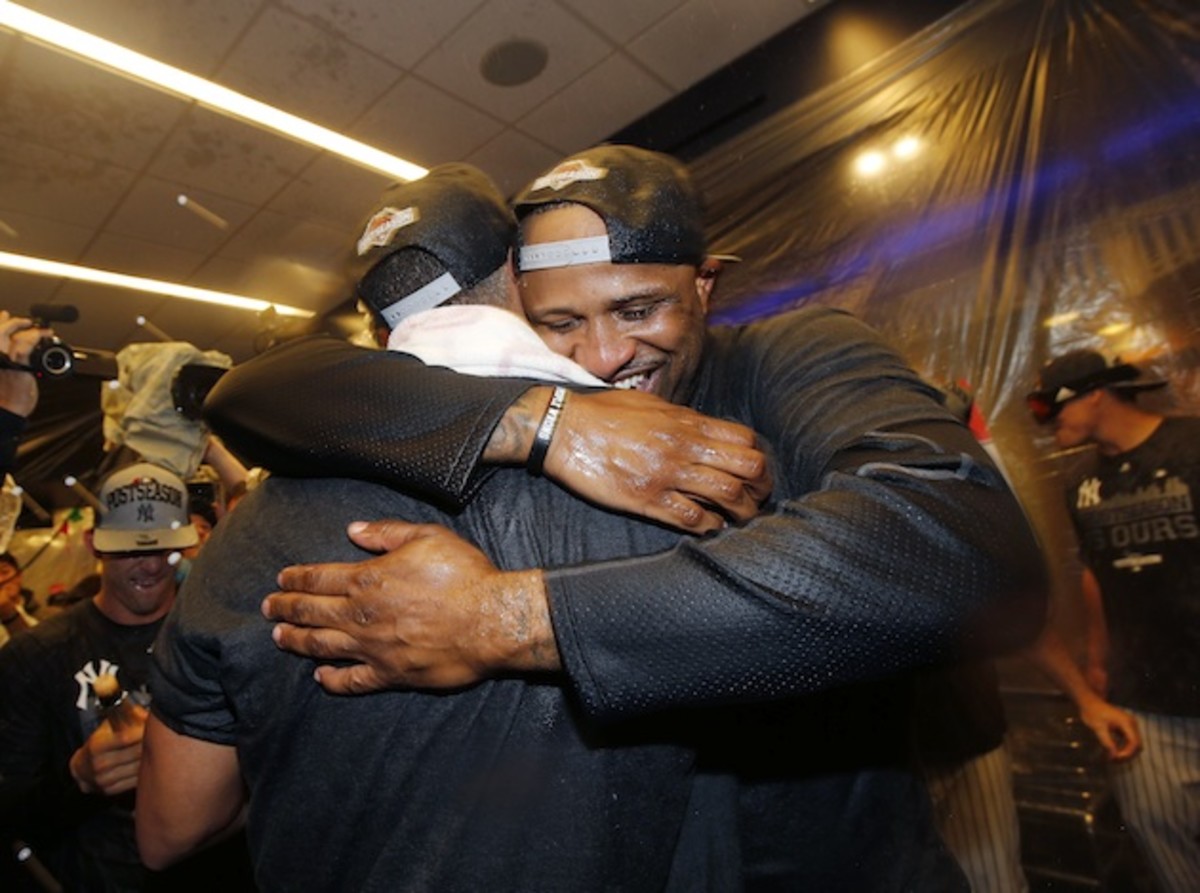As MLB playoffs begin, Yankees' CC Sabathia is right where he belongs

CC Sabathia has been a Major League pitcher since he broke in with the Indians in 2001, at the tender age of 20. Since then, he's taken the mound with almost superhuman regularity.
He has thrown 2,998 2/3 regular-season innings in the past 15 years—200 innings more than any other big leaguer, save Mark Buehrle. His pitching feats are the stuff of modern legend: taking the ball every four days down the stretch to help the Milwaukee Brewers clinch the 2008 Wild Card; leading a three-man rotation that delivered the Yankees a World Series title just one year later; tossing nine innings in the deciding game of the 2012 ALDS. Even this season, 34 years old and struggling through a recurrent knee injury, Sabathia managed to lead the Yankees in innings pitched. He takes the ball — anytime, anyplace.
Perhaps this is why Monday’s news that the well-respected and accomplished hurler had decided to seek treatment for alcohol abuse came as such a surprise. Sabathia is, by all accounts, a team leader and a quality person off the field. That one of the league’s toughest competitors decided to step away from baseball—a day before a winner-takes-all Wild Card Game, no less—would, under most circumstances, qualify as shocking. In this case, it isn't.

Addiction can strike anyone, anywhere, and at any time. Professional aren't immune. Sabathia’s problem obviously is serious enough to warrant tackling with the same determination he brought to the mound so many times during his career.
As Yankees GM Brian Cashman explained in his Monday afternoon press conference, Sabathia didn’t want the team to make excuses for his absence; he demanded to be held accountable.
Yankees' CC Sabathia checks into alcohol rehab, will miss playoffs
Sabathia isn't the first Major League Baseball player to struggle with alcoholism. Hall of Famer Ed Delahanty fell off a Niagara Falls bridge under uncertain circumstances in 1903 after he was kicked off a train for public intoxication. HidekiIrabu, who turned to alcohol as his once-promising career derailed, was drunk when he hanged himself in 2011.
If Irabu’s story doesn’t hit close enough to home for Yankees fans, all they need to do is look out to Monument Park. Alcohol nearly ruined the lives of Mickey Mantle, arguably the most gifted athlete in baseball history, and his longtime friend and teammate, Billy Martin. Whitey Ford was known to drink heavily, and the legendary Babe Ruth’s drinking prowess was perhaps second to none. As documented in HBO’s Babe Ruth, members of the Chicago White Sox reportedly took him out before a game and got him blitzed in an attempt to prevent him from beating them on the field, but Ruth showed up on no sleep, dominated and then asked the dumbfounded Sox where they were going for drinks after the game. Oddly, however, we tend to romanticize Ruth’s relationship with alcohol.
More recently, former Yankees setup man Scott Proctor — briefly a teammate of Sabathia’s, and also a hard worker on the mound — credited sobriety with saving his life, if not his career with with New York:

“I was miserable for so long, because I was living two different lifestyles,” Proctor said Saturday. “I just got to the point where enough was enough.”
Proctor said he could not recall a specific game or moment that he ruined because of alcohol. But too many late nights and too many beers caught up with him, he said, and by the time of his trade, it was obvious he had lost his chance to stay.
“When your body’s that dry from all the booze, it’s got to have an effect,” Proctor said. “You can’t be consistent when you’re doing that kind of stuff.”
Proctor was never a superstar like Sabathia, but the moment of clarity which led him to quit drinking mirrors what Cashman described:
Sometimes you simply wake up one day and realize that you have a problem, that you are not proud of the person you have become.
Yankees lose CC Sabathia for playoffs as veteran enters alcohol rehab
Should Sabathia have waited until his private demons became tabloid fodder, as Miguel Cabrera’s once did? Monday was nearly six years to the day after Cabrera, a sure-fire future Hall of Famer, was arrested following a drunken altercation with his wife during the final weekend of the 2009 season. He played all three of Detroit’s last three games — the Tigers fell to the Minnesota Twins in a one-game playoff — and then checked into rehab.
Cabrera waited until the world was watching to seek help; Sabathia didn’t. Of course, none of that makes one man a hero and the other a coward. If you have a health problem — physical or mental — there is no wrong time to admit it. What you do from that moment will better define you as a person than any statistic ever could.
Several years ago, Sabathia had already made it clear that he intended to prioritize his health when he dropped a ton of weight after his cousin died of heart disease. He struggled over the next two seasons, and many fans — myself included — jokingly called for the return of “Fat CC.” He responded by gaining 10 pounds during the most recent off-season.
It’s almost impossible to imagine another area in life in which a large man would be endlessly mocked for losing weight in order to lessen his chance of heart disease. My barber lost 40 pounds on his doctor’s orders, but I felt like his smaller gut affected the scissors-to-hair angle and resulted in a bad cut, so I cursed him out and told him to get fat again. Such is the warped world of sports, where the meaning of the phrase “life and death” is often perverted.
Baseball is not “life and death” — baseball is baseball, life is life, and death is death. It should be that simple, but when a baseball player chooses to work on his life over baseball — postseason baseball! — we find it difficult to comprehend.
As fans come to grips with his decision, perhaps it’s best to think of it this way: The month is October, and the eyes of the baseball world are once again focused on Sabathia as he puts himself to the test. Some fans are cheering, some fans are booing. His family, friends and teammates are behind him. He is exactly where he should be.

